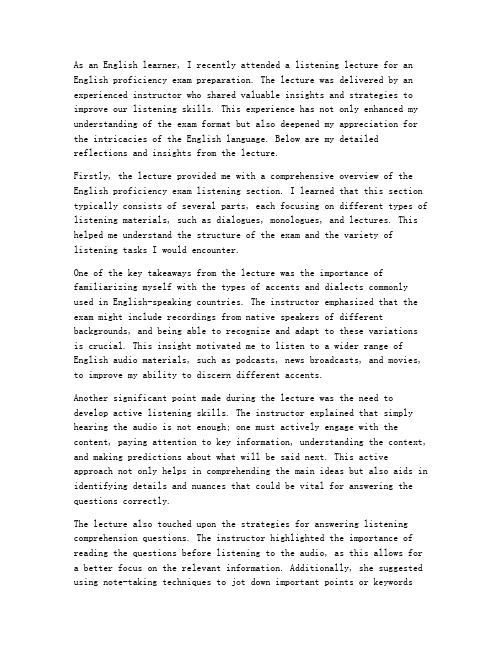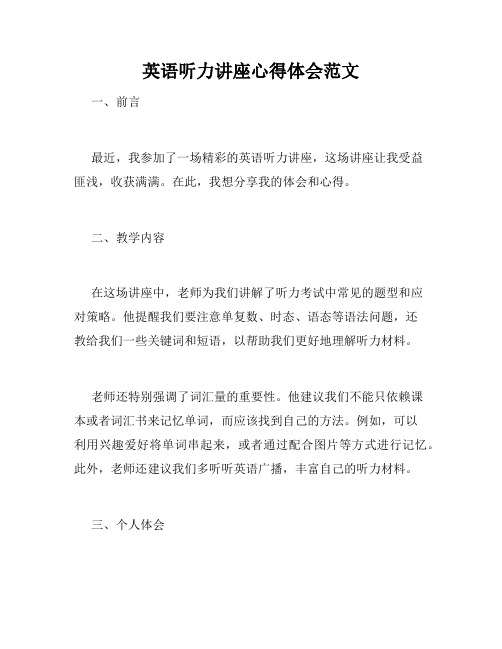VOA等英语广播听力心得范文
英语听力测试的心得体会

英语听力测试的心得体会在参加英语听力测试的过程中,我深刻体会到了准备的重要性、专注力的关键以及反思的重要性。
首先,准备是参加英语听力测试的关键。
就像参加任何考试一样,提前充分的准备是取得好成绩的关键。
在备考阶段,我主要通过听力材料、电视节目、电影等多种途径来提高自己的听力能力。
另外,我还积极参加英语角、口语班等活动,提高自己的听说能力。
这些准备使得我在真正参加英语听力测试时不会感到手足无措,对大部分内容能够有所听懂,并且能够确保自己听到的内容是准确无误的。
其次,专注力是取得好成绩的关键。
在英语听力测试中,专注力是非常重要的。
由于听力材料通常是以语速较快的方式播放的,因此在听的过程中,必须保持高度的专注力。
我发现,当我专注于听力材料时,我能够更好地理解内容,准确地捕捉到关键信息。
为了提高专注力,我在备考阶段练习了一些专注力训练,比如进行冥想、限制自己使用电子产品的时间等。
这些训练使得我在真正参加听力测试时能够保持冷静,不受干扰,提高了我的听力表现。
最后,反思是取得进步的关键。
无论在英语听力测试中是否达到了自己的目标,反思都是必不可少的一步。
通过反思,我能够找到自己在听力测试中的问题和不足,并且制定出相应的改进计划。
比如,我曾在一次听力测试中遇到了生词难以理解的问题,我通过反思发现自己在词汇量的积累上有所不足,于是我在之后加大了词汇量的学习,并通过广泛阅读等方式来扩大自己的词汇量。
通过不断地反思和改进,我相信自己的英语听力能力会得到显著提高。
总之,通过参加英语听力测试,我深刻体会到了准备的重要性、专注力的关键以及反思的重要性。
准备是取得好成绩的首要条件,专注力是确保听到内容并理解的必要条件,而反思则能帮助我们找到问题和改进的方向。
通过这些体会,我相信我在今后的英语学习中能够更好地提高自己的听力能力,取得更好的成绩。
英语考级听力讲座心得体会

As an English learner, I recently attended a listening lecture for an English proficiency exam preparation. The lecture was delivered by an experienced instructor who shared valuable insights and strategies to improve our listening skills. This experience has not only enhanced my understanding of the exam format but also deepened my appreciation for the intricacies of the English language. Below are my detailed reflections and insights from the lecture.Firstly, the lecture provided me with a comprehensive overview of the English proficiency exam listening section. I learned that this section typically consists of several parts, each focusing on different types of listening materials, such as dialogues, monologues, and lectures. This helped me understand the structure of the exam and the variety of listening tasks I would encounter.One of the key takeaways from the lecture was the importance of familiarizing myself with the types of accents and dialects commonly used in English-speaking countries. The instructor emphasized that the exam might include recordings from native speakers of different backgrounds, and being able to recognize and adapt to these variations is crucial. This insight motivated me to listen to a wider range of English audio materials, such as podcasts, news broadcasts, and movies, to improve my ability to discern different accents.Another significant point made during the lecture was the need to develop active listening skills. The instructor explained that simply hearing the audio is not enough; one must actively engage with the content, paying attention to key information, understanding the context, and making predictions about what will be said next. This active approach not only helps in comprehending the main ideas but also aids in identifying details and nuances that could be vital for answering the questions correctly.The lecture also touched upon the strategies for answering listening comprehension questions. The instructor highlighted the importance of reading the questions before listening to the audio, as this allows for a better focus on the relevant information. Additionally, she suggested using note-taking techniques to jot down important points or keywordsthat might appear in the questions. This approach not only aids in retaining information but also helps in analyzing the material more effectively.One particularly insightful part of the lecture was the emphasis on predicting the content and context of the listening material. The instructor explained that understanding the purpose and structure of the audio can greatly enhance one's ability to predict what will be said next. For example, if the material is a lecture, knowing that the speaker will likely provide an introduction, discuss the main points,and then summarize the information can help in anticipating the content and staying focused.Furthermore, the lecture provided practical tips on how to improveoverall listening comprehension. The instructor recommended regularly practicing listening exercises, starting with shorter clips andgradually increasing the length and complexity. She also advised on the use of online resources, such as language learning apps, websites, and YouTube channels, which offer a wide range of listening materialssuitable for different proficiency levels.One of the most valuable aspects of the lecture was the interactive component, where we had the opportunity to practice listening exercises under the instructor's guidance. This hands-on experience allowed me to immediately apply the strategies and techniques discussed in the lecture, thereby reinforcing my learning. The feedback and suggestions providedby the instructor were invaluable, as they helped me identify areas where I needed further improvement.In conclusion, the listening lecture for the English proficiency exam preparation was an enlightening experience. It not only equipped me with a wealth of knowledge and strategies to improve my listening skills but also inspired me to become a more dedicated and proactive learner. Here are some of the key insights and actions I intend to implement based on the lecture:1. Increase my exposure to a variety of English accents and dialects through diverse listening materials.2. Practice active listening by focusing on key information, understanding context, and predicting content.3. Utilize note-taking techniques to capture important details and keywords during listening exercises.4. Read questions before listening to the audio to improve focus and anticipation.5. Regularly engage in listening practice, gradually increasing the difficulty level as I progress.6. Leverage online resources and language learning apps to supplement my listening practice.In summary, the listening lecture has significantly impacted my approach to English learning and has given me a clearer path towards achieving my English proficiency goals. I am confident that by incorporating these insights and strategies into my daily routine, I will be well-prepared for the English proficiency exam and, more importantly, become a more proficient English speaker and listener.。
英语听力讲座心得体会范文

英语听力讲座心得体会范文一、前言最近,我参加了一场精彩的英语听力讲座,这场讲座让我受益匪浅,收获满满。
在此,我想分享我的体会和心得。
二、教学内容在这场讲座中,老师为我们讲解了听力考试中常见的题型和应对策略。
他提醒我们要注意单复数、时态、语态等语法问题,还教给我们一些关键词和短语,以帮助我们更好地理解听力材料。
老师还特别强调了词汇量的重要性。
他建议我们不能只依赖课本或者词汇书来记忆单词,而应该找到自己的方法。
例如,可以利用兴趣爱好将单词串起来,或者通过配合图片等方式进行记忆。
此外,老师还建议我们多听听英语广播,丰富自己的听力材料。
三、个人体会通过听这场讲座,我深刻地认识到了自己听力的不足,并且获取了一些提高听力的有效方法。
我发现,记忆单词是我目前英语学习的瓶颈,因此我决定试着用老师提供的方法——通过兴趣爱好将单词串起来来进行记忆。
我还计划抽出每天一段时间来收听英语广播,以便加强听力。
此外,我也意识到在听力考试中,细节是很关键的。
在此之前,我非常大意,以至于经常会因为一些小问题而错失习题的分数。
现在,我会更加细心地听,并需注意细节,以减少错误率。
最后,我想感谢老师的指导和建议。
这场讲座开阔了我的视野,启发了我的思考,是我英语学习的里程碑式的体验。
四、结语仅靠自己的努力,提高英语的听力是一项非常困难的任务。
但是,只要我们找到了一个好的方法,相信任何人都可以取得进步。
我相信只要我持之以恒地按照老师教的方法来学习,并且不断地进行反思和总结,我一定会在英语听力上取得更好的成绩。
专四听力心得体会5篇

专四听力心得体会5篇专四听力心得体会篇1英语听力常常考到的知识点会有租房场景、旅游场景和医疗场景等,作为语言构成的基本要素,词汇所导致的听力障碍在诸多英语学习者当中可谓是屡见不鲜。
因此在听力练习开始前,扫除那些因词汇而导致的听力障碍可谓是势在必行。
所以听的懂得首先解决生词问题。
一些冷门的知识点常常会让接触海外文化较少的学生失分,而有意的总结、积累考试中的冷门知识点,学生就较容易在听力考试中多拿分数。
虽然voaspecialenglish所采用的词汇相对较少,句型也比较简单,但还是有许多人听不懂,原因在于:其一,有些单词你觉得比较熟悉,但在听的时候就是反应不过来或者反应太慢。
其二,文章中另外存在着几类学习者不熟悉的词汇,比如说一些专有名词包括地名、人名、机构名和专业领域词汇等。
,一些用户不常用或者很少接触到的生僻词汇,一些发音上比较困难或者是读音相近,但意思却不同的词汇。
或者是一些词汇虽然常用,由于采用了不常用的含义,或者使用了单词的其它形式或短语,从而导致理解的偏差等等,针对这些单词,要求学习者先行了解,这样就会消除听力上的词汇障碍。
正如平常我们在运动前总是要做一些“热身”那样,尽量活动自身肌体的每一处肌肉和关节,以避免或减少剧烈运动可能带来的伤害。
听力练习也是如此,对于那些比较生疏,比较艰涩,比较专业的词汇,尽量听得越熟越好。
而在一些冷门单词上来说,动物的单词还算是冷门中的热门。
动物学的出现频率较高。
对中国学生而言,到国外求学除了能开阔眼界,进一步了解当地的文化和风情,更主要的目的仍是精深自己的学术知识。
因此,英语听力不仅涵盖了对生存能力的检测,也涉及到了对学生各方面学术知识理解能力的考察。
专四听力心得体会篇21,提高听力必须花费大量时间我花在听力上的时间很多。
大学刚毕业时,专门练习过托福听力,大约用了300小时。
后来断断续续听过北外的中级听力和“高听”,以及voa的se。
最近四年每天坚持听st,平均一天听2小时左右。
英语听力实践心得体会

As an essential part of language learning, listening comprehension plays a crucial role in our ability to communicate effectively in English. Over the past few months, I have engaged in various English listening practices, and I would like to share my experiences and reflections on this journey.IntroductionListening to English has always been a challenging task for me. Despite my years of studying the language, I often found myself struggling to understand native speakers in conversations or to follow the plots of English movies and TV shows. However, I realized that improving my listening skills was essential for my overall language proficiency. Therefore, I embarked on a journey to enhance my English listening abilities through different methods and activities.Methods and Activities1. Listening to English Music and PodcastsOne of the most enjoyable ways to practice English listening is through music and podcasts. Not only do they provide a fun and engaging way to immerse myself in the language, but they also expose me to different accents, vocabulary, and sentence structures. I have developed aplaylist of English songs and regularly listen to them while doing my daily tasks. Podcasts, on the other hand, have helped me understand current events, learn new information, and improve my concentration.2. Watching English Movies and TV ShowsWatching English movies and TV shows has been another effective method for me. I started by watching movies with subtitles in my native language and gradually transitioned to watching without them. This process helped me become more comfortable with the rhythm of spoken English and improved my ability to predict and infer meanings from context. Additionally, I watched shows from different genres, which broadened my vocabulary and allowed me to understand various social and cultural contexts.3. Listening to English News and RadioTo stay updated with global events and improve my listening skills, I began listening to English news broadcasts and radio stations. This practice has helped me develop my ability to listen for main ideas, details, and nuances in the language. I also took note of new vocabulary and expressions, which I later incorporated into my own speaking and writing.4. Engaging in English ConversationsInteractive listening, such as engaging in conversations with native speakers or language exchange partners, has been invaluable for my improvement. These conversations have allowed me to practice real-life listening situations and receive immediate feedback on my comprehension.I have also joined English language clubs and participated in online forums to practice listening and speaking simultaneously.Reflections and Insights1. Consistency is KeyImproving English listening skills requires consistent practice. By dedicating time each day to listen to English materials, I have noticed significant progress in my ability to understand spoken English. Consistency has been the cornerstone of my journey.2. Adaptability is ImportantAs I engaged in different listening activities, I realized that adapting to different accents, dialects, and speaking speeds was crucial. By being adaptable, I could better understand the language in various contexts.3. Active ListeningActive listening involves not only hearing the words but also paying attention to the speaker's tone, intonation, and non-verbal cues. By being an active listener, I could gain a deeper understanding of the message and context.4. Building a VocabularyA strong vocabulary is essential for effective listening. By learning new words and phrases, I could better understand the content and express myself more confidently.5. Setting Realistic GoalsSetting realistic goals and celebrating small victories has kept me motivated throughout my listening practice journey. By focusing on achievable goals, I could maintain my momentum and see progress over time.ConclusionImproving English listening skills has been a challenging but rewarding journey. Through various methods and activities, I have gained valuable insights into the importance of consistency, adaptability, active listening, vocabulary building, and goal setting. As I continue to practice and refine my listening skills, I am confident that my overall language proficiency will improve, enabling me to communicate more effectively in English.。
英语听力心得体会

英语听力心得体会【篇一:英语听力复习方法及心得】听力篇:一、听力主要解决以下三个问题:1. 听不懂的问题2. 找不到重点的问题3. 记不住的问题二、三个问题出现的原因及解决方法:(一)听不懂的主要原因及解决方法:1. 音标不清楚,自己发音不标准,那么听到一个词的时候可能会误解为另外一个词,当然搞不清意思;推荐两个网站可以解决音标的问题:英语国际音标,简单明了,可以做初步了解和查询只用,/post/shaguaguojiyinbiao1.html傻瓜国际音标,比较不错的教程,听一遍下来可以比较全面的认识音标。
2. 单词不认识;简单介绍背单词的方法,跟着录音带听和读,找准单词的发音。
英语六级考试的单词主要考察对单词的语音和书面识别,不需要会写,所以反复听读即可,无需浪费时间写下来。
3. 句子结构搞不清楚,这个问题应该不大,因为听力中的句子结构一般很简单,最多有几个强调句、倒装句,都是最基础的句式,将来在阅读长难句中可以得到练习。
(二)找不到重点的问题。
要抓住主线,层次清楚,抓住重点。
why, what, where, who。
英语段子中应该注意的几大要素。
听力中重点区域主要的分布(需要竖起耳朵听的内容)定义(by definition),描述(look at, see等,或对于过程规则的描述),原因(because, since, so, the reason, why),举例(for example, for instance, such as),比较(compared to/with, different from, differ to, unlike, dislike),强调:1)语气强调(重读或拉长等);强调句式,it is … that make me…;2)程度副词,如importantly, much more, absolutely,almost,barely,completely,enough,entirely,extreme-ly,fairly,far,hardly,just,much,nearly,only,quite等表程度的词;3)限定词,如only, all等4)转折词,如but, however。
英语听力感想 英语作文
英语听力感想英语作文英文回答:After listening to the English audio, I felt that my listening skills have improved a lot. I used to have trouble understanding fast-paced conversations, but now I can catch most of the words and phrases. For example, in the audio, the speaker mentioned that "the early bird catches the worm," which means that success comes to those who are proactive and prepared. This is a common English idiom that I have heard before, and it was great to recognize it in the audio. Overall, I think listening to English audio has helped me become more familiar with natural speech patterns and colloquial expressions.中文回答:听完英语音频后,我觉得我的听力水平有了很大的提高。
以前我经常听不懂快节奏的对话,但现在我能够听懂大部分的单词和短语。
比如,在音频中,说话者提到了“早起的鸟儿有虫吃”,这意味着成功来自于那些主动和有准备的人。
这是一个我以前听过的常见的英语习语,能够在音频中认出来真是太棒了。
总的来说,听英语音频让我更加熟悉了自然的语音模式和口语表达。
外语听力反思总结范文
一、前言在外语学习中,听力是一项至关重要的技能。
它不仅关乎语言交流的顺畅,还影响着语言学习的深度和广度。
在过去的学习过程中,我对外语听力进行了多次实践和尝试,现将自己的学习经历和心得进行总结和反思。
二、学习过程回顾1. 初始阶段刚开始学习外语时,我对听力充满了好奇和期待。
通过收听英语广播、观看英语电影等方式,我逐渐熟悉了外语的语音和语调。
然而,在实际交流中,我发现自己仍然存在很多问题,如听不懂长句、听不清人名地名等。
2. 提升阶段为了提高听力水平,我采取了以下几种方法:(1)大量听写:通过听写,我锻炼了耳朵对语音的敏感度,同时提高了拼写能力。
(2)跟读模仿:模仿英语母语者的发音和语调,使自己的口语更加地道。
(3)听力材料多样化:除了英语课程教材,我还收听了各种英语节目、新闻、讲座等,丰富自己的听力素材。
(4)听力训练软件:利用手机、电脑等设备,下载听力训练软件,进行专项训练。
3. 收获阶段经过一段时间的努力,我的听力水平有了明显提高。
在与人交流时,我能基本听懂对方的意思;在阅读文章时,能较快地抓住文章主旨;在听英语讲座时,能跟上讲座思路。
三、反思与总结1. 持之以恒听力水平的提高并非一朝一夕之功,需要长期坚持。
我在学习过程中,始终保持对听力的关注和投入,才取得了现在的成绩。
2. 多样化学习在听力训练中,我意识到多样化学习的重要性。
通过听不同的材料,我提高了对不同语境、语速的适应能力。
3. 勤于实践实践是检验真理的唯一标准。
在听力学习中,我积极参加各种英语活动,如英语角、演讲比赛等,将所学知识运用到实际生活中。
4. 重视基础在听力学习中,我发现基础知识的重要性。
只有掌握了一定的词汇和语法知识,才能更好地理解听力材料。
5. 保持耐心听力学习过程中,难免会遇到挫折和困难。
保持耐心,相信自己能够克服困难,是提高听力水平的关键。
四、展望未来在今后的学习中,我将继续保持对听力的关注,不断丰富自己的听力素材,提高听力水平。
英语听力收获和感悟
英语听力收获和感悟英语听力收获和感悟随着全球化的加速,英语成为了连接世界的纽带,越来越多的人开始学习英语。
其中,英语听力作为英语学习中的关键环节,是许多学习者都面临的难题。
曾经的我也曾经历了这一难关,但在经历了一些时间的磨练后,我不仅提高了自己的听力水平,更收获了很多感悟。
收获1. 增强语感通过听懂英语中的不同音调、音量和语速等因素,我们可以逐渐建立起自己的语感,提高语音语调准确性。
我曾经通过听力练习,慢慢地向外籍老师学习英式发音,提高了自己的口语能力。
2. 拓展词汇量听力让我们有机会接触到更多的英文词汇和语言表达方式,这些都能帮助我们日后更好地运用英语。
在我学习英语期间,通过认真听取英文原声,我不仅学到了大量的单词和词汇搭配,更丰富了自己的表达方式。
3. 提高听力能力通过不断的听力练习,我们可以提高自己的听力水平,逐渐听懂并理解更多的英语内容。
这也是我们学习英语不可或缺的一部分。
我曾经在学习期间不断地练习听力,慢慢地明白了英语口语中的各种不同表达方式和词汇搭配。
感悟1. 坚持是关键学习英语需要我们坚持不懈,不断地练习和积累。
在我学习英语的过程中,就曾经遇到过学习瓶颈,但我不放弃,坚持练习,并且渐渐地取得了进步。
2. 多听多读多想我们需要更多的接触英语,不仅是通过听力来学习,也需要通过阅读、思考来深入理解英文表达方式和词汇用法。
我经常会阅读英文原著,思考其中不同的表达方式和文化背景,这有助于扩宽我的思维和提高英语综合能力。
3. 应用是最好的老师只有通过真实地应用英语,我们才能真正地掌握英语,培养自己的口语能力。
在我学习英语的过程中,我坚持每天与外籍老师交流,这让我更加深入地理解英语文化,并且提高了自己的口语表达能力。
总之,英语听力让我深刻地认识到学习语言需要坚持和不断地练习。
在练习的同时,我们还需要注重拓展自己的词汇量和语感,这些都是培养英语能力中不可或缺的因素。
即使我们学习的过程中遇到了各种困难和挑战,只要我们能坚持不懈,相信未来一定会更加光明。
沪江VOA练习听力中的一些经验和体会
沪江VOA练习听力中的一些经验和体会
在使用沪江VOA练习听力时,我有一些经验和体会可以分享:
1. 提前准备:在开始练习听力之前,先花一点时间阅读相关的文章或文本。
这样可以
帮助我熟悉话题、了解背景信息,这对于更好地理解听力材料是很有帮助的。
2. 多次听听力材料:听力材料有时候会比较长,并且可能会有一些复杂的语句和词汇。
因此,我会多次听听力材料,以确保我能够完全理解其中的内容。
每次听时,我会尝
试更专注地聆听,并注意听力材料中的重点信息。
3. 记笔记:在听力过程中,我喜欢用笔记把一些重要信息写下来。
这对我来说有两个
好处:一是可以帮助我更好地记住听到的内容,二是在做完听力之后可以通过阅读自
己的笔记来确保我对内容的理解是准确的。
4. 分段理解:有些听力材料可能会包含一些长的句子和复杂的结构,对于理解这样的
句子,我会尝试将其分成更小的部分来阅读,并逐步理解每个部分的含义。
这样做可
以帮助我更好地理解整个句子的含义。
5. 多样练习:除了使用沪江VOA练习听力,我也会尝试其他的听力练习资源,例如其他网站或应用程序。
这样做可以帮助我获得不同的听力体验,并提高我应对不同类型
听力材料的能力。
总之,使用沪江VOA练习听力需要持续的练习和耐心。
通过采用适合自己的学习方法,不断提高自己的听力技能,我相信能够在听力方面取得进步。
- 1、下载文档前请自行甄别文档内容的完整性,平台不提供额外的编辑、内容补充、找答案等附加服务。
- 2、"仅部分预览"的文档,不可在线预览部分如存在完整性等问题,可反馈申请退款(可完整预览的文档不适用该条件!)。
- 3、如文档侵犯您的权益,请联系客服反馈,我们会尽快为您处理(人工客服工作时间:9:00-18:30)。
VOA等英语广播听力心得范文
许多学英语的人都希望收听VOA,BBC等英语新闻广播,想以此来提高听力和口语水平,但不少人认为听英语新闻广播比较困难。
从这几年的中等以上英语听力考试来看,都涉及到测试英语新闻广播的内容。
从教学上来说,许多大专院校的英语系的听力课都增加了听英语新闻报道的内容。
那么怎样才能基本上听懂外台的英语新闻报道呢?我们认为,除了多听以外,还必须掌握英语新闻报道的特点和一些收听技巧。
(1)掌握新闻报道的结构新闻报道往往采用“倒金字塔体”。
所谓“倒金字塔体”,也称为倒途法,即按新闻事实重要性的程度由要点到细节逐步扩展,安排全文。
把最重要的事实置于全文的第一个句子中,这个句子被称为新闻导语(the news lead)。
它告知听众最关心最重要的事实,如事件(what)、时间(when)、地点(where)、人物(who),以及原因和方式(why,how,即新闻导语包含了我们常说的五个WH和一个H构成的“新闻六大要素”。
新闻导语是整条新闻的高度浓缩形式,听懂了导语,也就听懂了新闻的主要内容。
当然,由于新闻报道的侧重点不同,有时新闻导语也可能只包含其中几个要素。
例如:
Oil ministers of the Organization of Petroleum Exporting Countries will bold an emergency meeting Friday to discuss.
这一新闻导语包含了以下几个要素:
What:An emergency meeting vail be held
When:Friday
Who:Oil Ministers Of the Organization of Petroleum Ex—poring Countries
(2)扩大词汇量,熟记新闻报道中的常用词汇
①普通词汇。
尽管新闻报道所使用的词汇量很大,但是语言的基本词汇是稳定的。
如VOA广播中的special English(特别节目)的新闻报告中常用词汇约1 500个,这的重复率在报道中是很高的,如cease-fire,presidential eleation等政治性词汇,financebankinggroup等经济词汇以aceshuttle,robot等科技词汇。
而新闻英语中的特有用语就更具稳定性。
若能掌握这些词汇,再加上一些听力技巧,基本听懂新闻报道就不是件难事了。
②专有词汇。
新闻报道是有关世界范围的最新消息,因在报道中常涉及许多人名、地名、国名。
除此之外,新闻报道中还常常出现一些河流、山脉及名胜古迹等专有名词熟悉这些专有名词可使听者更快更准确地了解所听的新闻。
(3)掌握一定数量的缩略语(acronym)
由于新闻报道时间的限制,不少机构的名称常采用其缩略形式,即由该名称中数个词的首字母的大写形式组成,如:PLO是thePalestineLiberationOrganization的缩写形式。
需要注意的是,听者不仅要了解这些缩略语的确切含义,而且还应知道它们的正确读音。
(4)掌握数字的不同读法
在新闻报道中经常出现许多数字,大到几十亿,上百亿,小到分数或小数。
尤其对一些多位数的数字,要想立刻听准这些数字的确不容易,其主要难点在于位数过多。
因此在听多位数的数字时,应对billion(十亿)、million(百万)、thousand(千)、hundred(百)等词尤为重视。
同时,要注意一个数字的多种读法,如播音员把两个足球队比赛结果2:0读作two to nothing 而不是读成two to nought或two to zero.
(5)掌握循序渐进,从慢到快的原则
目前,许多外台(如BBC,VOA)的新闻英语报道有特别英语(Special English)和标准英语(Standard English)两种。
所谓Special English也可称为慢速英语,即新闻播放的语速较慢。
就VOA而言,慢速英语每分钟不超过90个单词,而且新闻报道均是由简单易懂的英语缩写的,因此较适合初级阶段的新闻英语训练。
然而它毕竟有其局限性,只能作为听力训练的一种手
段,而不是新闻英语训练要达到的最终目的。
要想过真正通过新闻英语这一关,还必须进行Standard English的训练。
Standard English也可称为常速英语,即新闻英语是用正常的语速播送的。
就VOA而言,常速英语每分钟为135个单词,而且句法和词汇方面的难度也大些。
经过从慢速英语到常速英语相当长一段时间练习后,收听新闻英语的能力一定会有很大提高。
(6)要密切注意国内外形势的变化
平时应养成多看报纸,常听广播的习惯,这样就可以掌国际、国内的一些阶段性的热门话题及一些有争论的问题。
若有可能的话,最好在收听新闻英语之前,先听一下汉语新闻广播。
对于当天国际、国内发生的一些大事做到心中有数,然后,再收听外台的新闻英语报道。
由于已有了一定背景知识,这些新闻英语报道就容易听懂了。
当然在更高层次上也可以先听英语新闻,然后验之以汉语新闻。
收听英语新闻广播时有两点要注意:
①听懂英语新闻广播必须要有一定的听力理解水平,因对于外语初学者来说,应着重提高自己的英语听力水平,不要急于收听外台新闻广播,到了中高级阶段开始收听英语新闻广播较为合适。
②听者除掌握以上提到的技巧外,还必须多听多练,持之以恒地坚持听下去,就能最终达到“能听懂外台英语新闻广播”这一目标。
